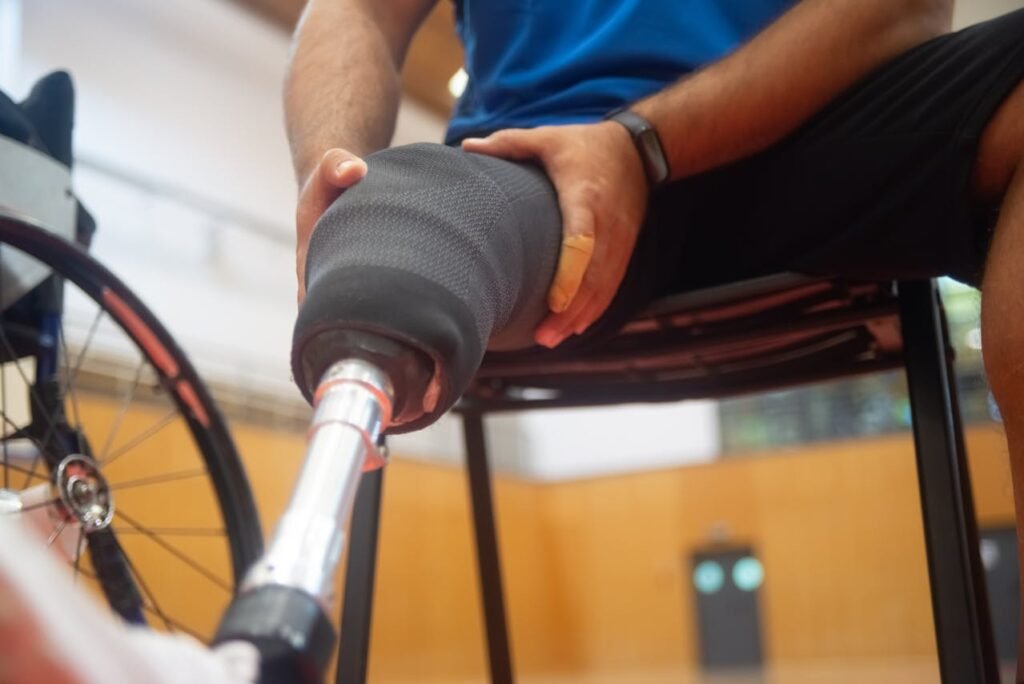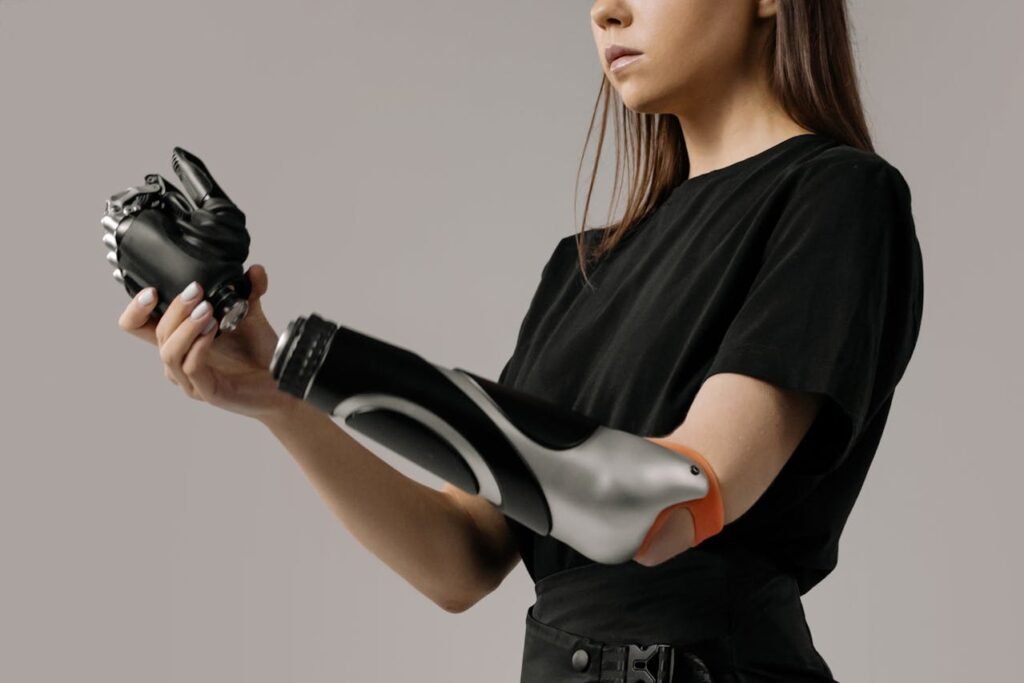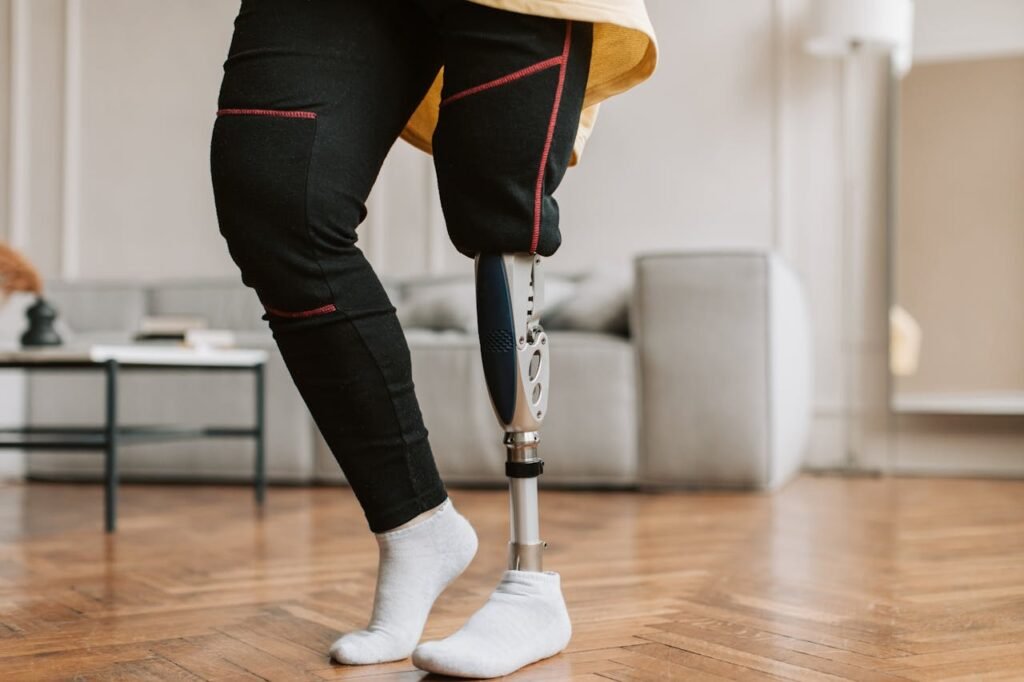India’s weather is full of character—bright summers, heavy monsoons, and long humid months in between. For most people, these seasons bring small adjustments in daily routines. But for senior prosthetic users, every change in temperature, moisture, or humidity can affect both comfort and safety.
The heat can make liners sticky, cause sweat rashes, and lead to discomfort that discourages regular prosthetic use. Monsoon rain, on the other hand, introduces the challenge of moisture—wet conditions that can loosen grips, cause skin irritation, and sometimes even affect electronic parts in advanced prosthetics.
These issues are not obstacles—they are reminders that the body and the prosthetic need care, just like any other part of daily life. With small, thoughtful habits, seniors can continue to walk, work, and live comfortably throughout India’s changing seasons.
This guide shares practical, India-specific advice for handling both monsoon and summer heat—covering everything from skin care, hygiene, clothing, and prosthetic protection to emotional wellness. The goal is simple: to help every senior move freely and confidently, rain or shine.
Understanding Seasonal Challenges for Senior Prosthetic Users in India
Why Weather Affects Prosthetic Use

India’s weather swings from dry heat to heavy rain within months. These shifts affect not just comfort but the performance of prosthetic limbs. Seniors often notice changes in fit, grip, and skin feel depending on humidity levels and temperature.
Hot weather increases sweating, which can make prosthetic liners slippery and cause skin irritation. During monsoons, trapped moisture may lead to fungal infections or rusting in metallic parts if not cared for properly.
Understanding these effects helps seniors prepare early—adjusting routines before problems appear rather than reacting after discomfort sets in.
The Body’s Response to Climate
Older bodies regulate temperature less efficiently. Seniors with prosthetics might feel heat more intensely on the residual limb, where air circulation is limited. In humid climates, sweat evaporation slows, trapping moisture under the liner.
During monsoons, temperature drops suddenly, and damp conditions increase sensitivity in joints and muscles. Some seniors may experience stiffness or mild swelling in their limbs, which can alter the prosthetic’s fit temporarily.
Recognizing these natural reactions prevents confusion or worry when sensations change with the weather.
The Challenge of Indian Summers
Indian summers can reach extreme highs—especially in states like Rajasthan, Delhi, and Maharashtra. For seniors, this means longer hours indoors and shorter outdoor routines.
Heat causes the body to lose water faster. Without proper hydration, muscles tire easily, and myoelectric prosthetic signals may weaken due to slight dehydration. Skin under the socket can also become warm and itchy.
In such conditions, it’s not about avoiding movement but learning how to stay cool, protected, and energized.
The Impact of Humidity on Prosthetics
Humidity is the quiet troublemaker. Even without visible sweat, moisture seeps into liners, foam padding, and socket corners. Over time, it causes bacterial buildup or musty odors.
For seniors with sensitive skin, this can mean rashes or redness. Humidity can also affect battery-powered prosthetics like the Grippy™ Bionic Hand if they’re not stored properly.
A dry, ventilated storage area is essential during these months. Keeping a soft towel or absorbent cloth handy after walks or outdoor chores also helps manage moisture.
Monsoon Mobility Concerns
The monsoon season brings slippery pavements, damp shoes, and unexpected puddles. For seniors using lower-limb prosthetics, even short walks require caution.
Rubber soles, anti-slip mats near entrances, and slow, deliberate steps prevent most accidents. For upper-limb users, humid air can make grip feel different—metal handles or railings may feel slippery or cold.
With proper footwear, stable posture, and gentle balance practice, seniors can still enjoy fresh monsoon walks without fear.
Why Care Routines Must Change with the Weather
A single care routine doesn’t work for all seasons. Summer calls for cooling and moisture control, while monsoon care is about dryness and hygiene.
Small adjustments—like switching to lighter liners, changing washing frequency, or storing prosthetics differently—make a big difference in comfort and safety.
A seasonal mindset helps seniors stay active without constant discomfort or interruptions in prosthetic use.
Heat Care: Staying Cool and Comfortable with Prosthetics
Keeping the Residual Limb Dry
During summer, the most common complaint among prosthetic users is excessive sweating inside the socket. Seniors should use breathable liners that wick away moisture instead of trapping it.
At home, removing the prosthetic for short breaks during the day lets the skin breathe. Gently patting the limb dry with a soft towel—never rubbing—prevents irritation.
If sweating persists, a thin layer of medical-grade antiperspirant (recommended by a prosthetist) can help. However, avoid talcum powders, as they can clog pores or clump under the liner.
Choosing the Right Clothing
Clothing should feel light and allow airflow. Loose cotton or bamboo fabrics are ideal for Indian summers. Avoid synthetic materials that trap heat or cause itching.
For lower-limb prosthetic users, soft breathable socks protect the liner and prevent skin friction. Socks should be changed daily—or even twice a day—during very hot spells.
Dark colors absorb heat faster. Choosing light shades like white, beige, or pastel tones keeps the body cooler outdoors.
Managing Outdoor Activities in Heat
Seniors should schedule outdoor walks or errands early in the morning or after sunset when the temperature drops. Avoid peak hours between 11 a.m. and 4 p.m. when roads and pavements radiate heat.
Carrying a small towel, cap, and water bottle helps prevent overheating. Short, shaded breaks between activities allow the body to reset before continuing.
If dizziness, excessive sweating, or fatigue occurs, rest indoors and hydrate immediately. Heat exhaustion develops quickly in older adults, especially those using prosthetics that cover large areas of skin.
Staying Hydrated for Better Muscle Control
Hydration affects more than thirst—it influences prosthetic control. For users of myoelectric limbs, mild dehydration can weaken electrical signals, making grip response slower.
Seniors should drink small amounts of water throughout the day, even when not thirsty. Fresh coconut water, lemon water, or buttermilk can replace lost salts and minerals naturally.
Limiting caffeine and very sugary drinks helps maintain steady hydration without spikes or crashes in energy.
Protecting the Prosthetic from Heat Damage
Direct sunlight and high temperatures can affect the durability of prosthetic materials. Plastic and silicone parts may expand slightly, altering fit. Battery-powered systems may also overheat if left in cars or near windows.
Always store prosthetics in a shaded, cool area. When traveling, use the protective cover or carry bag provided. Avoid placing the prosthetic on hot surfaces, like car dashboards or metal chairs.
For seniors using devices like Grippy™, charging should always be done in a ventilated area. Heat buildup during charging shortens battery life over time.
Preventing Skin Irritation and Rashes
The combination of sweat, heat, and friction can cause red patches or small blisters on the skin. Once irritation starts, it can quickly worsen in warm weather.
Seniors should clean the residual limb with mild soap and lukewarm water every evening. Pat dry thoroughly and let the skin rest before reattaching the prosthetic.
If redness appears, apply a soothing, fragrance-free moisturizer before bed. Persistent irritation should be checked by a doctor or prosthetist—it might indicate that the liner needs resizing or replacement.
Cooling Strategies During Daily Routines
Simple cooling techniques help seniors stay comfortable through the day. Using a fan or air cooler near resting areas prevents sweat buildup around the limb.
Cold compresses can relieve warmth on the residual limb, especially after outdoor walks. Seniors can wrap ice cubes in a cloth and gently press around—not on—the socket area for a few minutes.
Even basic actions, like keeping feet elevated during rest, help improve blood flow and reduce swelling from heat.
Diet Tips for Hot Weather Balance
Diet plays a quiet but important role in prosthetic comfort. Heavy, oily meals increase body heat, while fresh, water-rich foods like cucumber, watermelon, and leafy greens keep the body light and hydrated.
Eating smaller, frequent meals prevents bloating and fatigue. Seniors should include potassium-rich foods like bananas to reduce muscle cramps that can occur in hot conditions.
Avoiding excessive salt and spicy foods minimizes dehydration. A balanced diet supports stamina and helps the body cope better with seasonal stress.
Understanding Heat-Related Swelling
Seniors might notice mild swelling in their residual limb during extreme heat. This happens when blood vessels expand to cool the body. While temporary, it can affect prosthetic fit.
If swelling occurs, elevate the limb for a few minutes, apply a cool cloth, and avoid wearing the prosthetic for prolonged periods. Once the swelling subsides, recheck the socket fit.
Persistent swelling, however, needs professional attention—it might signal circulation issues or poor prosthetic alignment.
Restoring Comfort After a Long Hot Day
After a full day of wearing the prosthetic in summer, it’s vital to give both the skin and device time to recover. Remove the prosthetic, clean it thoroughly, and inspect the liner for any dampness or odor.
A light massage with cooling aloe gel or plain coconut oil before bed soothes the skin and prevents dryness. Seniors should sleep without the prosthetic to allow natural blood circulation overnight.
A clean fan, calm room, and breathable bedding make night rest more refreshing, setting the stage for another active day.
Monsoon Care: Managing Moisture, Safety, and Hygiene
Understanding the Risks of Monsoon Moisture

India’s monsoon is a season of relief and challenge. The rain cools the air, but it also brings humidity that never seems to dry. For seniors using prosthetics, moisture becomes the main enemy—creeping into joints, sockets, liners, and skin folds.
Even small amounts of trapped dampness can lead to odor, skin infections, or mechanical issues. The trick is not to avoid the rain entirely but to stay one step ahead with smart habits.
Keeping the Prosthetic Dry During Rain
Whenever possible, avoid stepping out in heavy downpours. If travel is unavoidable, use waterproof sleeves or covers over the prosthetic. Many affordable options are available in India—lightweight, reusable covers that seal snugly at the top.
Umbrellas and long raincoats that reach below the knees protect both the body and device. For lower-limb users, it helps to carry a spare pair of socks or a small towel in a bag to dry off quickly after entering a dry area.
Never use hairdryers or direct heat to dry the prosthetic afterward; gentle wiping with a clean cloth and natural air circulation is best.
Storing Prosthetics During Humid Months
Humidity can linger indoors for days, even when it’s not raining outside. Prosthetics should always be stored in a well-ventilated area, never inside closed cupboards or near wet clothes.
If possible, place silica gel packets or moisture-absorbing pouches in the storage box. These small packets quietly pull away excess humidity and keep the components dry.
Electronic prosthetics should be disconnected from power when not in use and kept away from water sources like sinks or open windows.
Caring for the Residual Limb in Damp Conditions
Moist skin is more fragile than dry skin. During the monsoon, seniors should clean their residual limb at least twice daily with mild soap and pat dry completely.
After cleaning, leave the skin uncovered for 10 to 15 minutes before reattaching the prosthetic. This airing time allows any invisible moisture to evaporate.
If the skin feels itchy or sticky, it’s a sign that bacteria might be starting to grow. A light dusting of antifungal powder (as advised by a doctor) helps keep the area clean without irritating the skin.
Choosing Footwear for Rainy Weather
Wet footwear is one of the biggest causes of slips and skin irritation. For seniors using lower-limb prosthetics, good-quality non-slip shoes are essential. Rubber soles with deep patterns provide grip even on wet marble or tiles.
Avoid flip-flops or open sandals in public places, as they increase the risk of slipping or splashing dirt into the prosthetic joint. Instead, choose covered shoes made from quick-drying materials like EVA or treated fabric.
After walks or temple visits, remove shoes immediately, wipe both the prosthetic foot and the natural one, and let them dry naturally before storage.
Handling Slippery Surfaces Indoors
Monsoon moisture doesn’t stop at the doorstep—it often sneaks into homes. Wet footprints, dripping umbrellas, or floor mats can create unexpected hazards.
Seniors should use absorbent floor mats near entrances and avoid polished tiles when possible. Anti-slip mats in bathrooms and corridors reduce risks further.
When walking indoors, short, steady steps work better than long strides. Keep feet close to the ground and focus on balance rather than speed.
Preventing Fungal and Bacterial Growth
The warm, moist conditions of monsoon create an ideal environment for microbes. Seniors should clean prosthetic liners, socks, and sleeves every day. Using mild antiseptic soap in warm water and allowing them to air-dry completely keeps infections away.
Do not store liners or socks in sealed plastic bags while damp—it traps moisture. Instead, hang them on a rack or towel stand near a fan.
If redness, odor, or small bumps appear on the residual limb, stop using the prosthetic for a day and seek medical advice. Early care prevents small rashes from becoming painful infections.
Managing Battery-Powered Prosthetics During Monsoon
Myoelectric prosthetics like the Grippy™ Bionic Hand rely on sensors and batteries that must stay dry. Even light condensation can interfere with signals.
Always check that connectors and ports are clean and moisture-free before use. After outdoor exposure, wipe the prosthetic with a soft dry cloth and leave it open for ventilation.
During very humid spells, keep electronic prosthetics inside rooms with a ceiling fan or a dehumidifier if available. Never store them near windows or damp corners.
Traveling Safely in Rainy Conditions
Traveling during the monsoon requires patience and planning. Seniors should choose stable, accessible routes rather than shortcuts through muddy or uneven paths.
Public transport areas like bus stops or train stations can be slippery. Walking close to railings and holding support handles provides safety and balance.
For temple visits or social events, carrying an extra liner or dry sock can be very helpful. Wet liners not only feel uncomfortable but can also loosen grip, increasing the risk of falls.
Handling Skin Softness and Swelling
Constant humidity makes the skin softer, increasing friction against the socket. Seniors might feel more pressure or minor rubbing.
Using soft cotton socks or a moisture-absorbing liner between the skin and socket reduces direct contact and prevents chafing. If mild swelling occurs, remove the prosthetic for a short while and rest with the leg or arm elevated.
Persistent swelling or blisters should never be ignored; it could indicate infection or poor ventilation inside the socket.
Creating a Monsoon Care Routine
Monsoon care becomes effortless when built into a simple daily routine. Clean, dry, inspect, and air—these four steps are enough to keep both body and prosthetic in top shape.
Morning: Clean the limb and prosthetic, inspect for any wetness, and ensure fit before leaving home.
Afternoon: Wipe away moisture after outdoor activities or errands.
Evening: Clean again before sleep, leave the prosthetic uncovered for drying, and check the skin carefully for redness.
By repeating this rhythm every day, seniors can enjoy monsoon mobility without constant worry.
Preventing Weather-Related Wear and Tear on Prosthetics
How Weather Impacts Materials

Prosthetic limbs are made from advanced materials—metals, plastics, silicone, and sometimes carbon fiber. Each reacts differently to temperature and humidity.
Heat expands materials slightly, while moisture can loosen joints or create corrosion over time. In India’s alternating summer and monsoon seasons, this expansion and contraction cycle repeats often.
Understanding this helps seniors spot small signs early, such as loosened screws, squeaky joints, or minor cracks. Routine care prevents larger problems later.
Cleaning Techniques for Rain and Heat
For everyday cleaning, a soft cloth and mild soap are enough. Avoid harsh detergents or alcohol-based cleaners, as they can damage the outer coating of the prosthetic.
During humid months, wiping down the limb after every outdoor trip removes unseen dirt and moisture. Once a week, give the prosthetic a deeper clean, ensuring that no joints or hinges hold trapped water.
After cleaning, leave the prosthetic in open air for at least an hour before wearing it again. Avoid using heat sources for drying, as sudden temperature changes may warp parts.
Checking for Corrosion and Rust
Metal components, screws, or rods inside prosthetics are usually treated to resist rust, but constant exposure to moisture can still cause minor corrosion.
Seniors should look for discolored spots or rough textures on metallic areas. If noticed, wiping them with a dry cloth and applying a light protective oil (only if approved by the prosthetist) prevents further damage.
Electronic parts, however, should never come in contact with oil or water—only gentle cleaning and immediate drying if damp.
Socket and Liner Care Across Seasons
Sockets and liners are closest to the skin, so their hygiene directly affects comfort. During summer, they need frequent washing to remove sweat; during monsoon, to remove moisture and odor.
Always dry liners completely before reuse. If a liner feels sticky or soft even after drying, it might have absorbed too much humidity—keep a spare set to rotate daily.
In India’s humid regions like Kerala or Bengal, storing liners in breathable cotton bags helps prevent mold.
Seasonal Maintenance Visits
Regular professional check-ups are vital, especially after extreme weather. A prosthetist can recheck alignment, refit sockets, and tighten any loosened components.
Ideally, seniors should schedule a maintenance visit at the start and end of each major season—March before summer, and September after the monsoon.
This habit keeps performance consistent and avoids unexpected breakdowns during active months.
Travel Tips for Seasonal Changes
When traveling between cities or regions with different climates, the prosthetic may react differently. For example, moving from dry Delhi to humid Chennai can alter how the socket feels within days.
Seniors should pack extra liners, socks, and cleaning supplies. If staying longer, a quick visit to a local prosthetic center for a fit check ensures comfort.
At RoboBionics, our partner centers across India help users adjust quickly when they move between climates. A few minutes of calibration can save weeks of discomfort.
Caring for the Prosthetic’s Battery
Battery care changes with temperature. In heat, batteries discharge faster; in humidity, they risk moisture exposure.
Always charge in a cool, dry room and unplug after full charge. Avoid charging overnight or placing chargers near windows during monsoon.
If the prosthetic will not be used for a few days, remove the battery and store it separately in a dry case. These small habits extend the battery’s lifespan and performance.
Maintaining Joint and Grip Function
Humidity and dirt can affect the smoothness of mechanical joints. Seniors using upper-limb prosthetics should gently flex each joint after cleaning to ensure no stiffness.
For lower-limb prosthetics, checking the foot’s grip and rubber sole ensures safe walking even after weeks of rain or heat. If grip feels uneven or squeaky, contact a prosthetist for minor adjustments.
Smooth joints reduce effort and improve energy efficiency, making walking or movement feel lighter and natural.
Emotional Balance Through Routine
Weather discomfort can affect mood. Feeling restricted indoors during rain or heat can lead to frustration or loneliness. Having a routine of indoor activities—light stretches, seated exercises, reading, or music—keeps spirits high.
Even gentle daily care rituals can be grounding. Cleaning, organizing, and preparing for the next day’s walk build a quiet sense of control and peace.
Seniors who stay emotionally balanced tend to manage seasonal stress better and maintain a steadier recovery rhythm.
Long-Term Seasonal Health, Emotional Wellbeing, and Conclusion
How the Seasons Shape Senior Wellness

Every season in India brings new experiences for senior prosthetic users. The warmth of summer teaches awareness; the rains teach adaptability. Over time, these small adjustments strengthen both body and spirit.
When seniors learn to move comfortably through heat, humidity, and dampness, they don’t just protect their prosthetics—they protect their confidence. Their daily rhythm continues smoothly, and walking, writing, or cooking stays part of life, not something to be postponed because of weather.
The seasons, when respected rather than feared, become natural partners in healing.
Creating a Year-Round Prosthetic Care Plan
Caring for a prosthetic shouldn’t feel like a chore. It works best when built into a gentle daily and seasonal rhythm.
In summer, focus on cooling and hydration. During monsoon, focus on dryness and hygiene. In winter, warmth and skin flexibility become priorities. This rotation of care keeps both comfort and device health balanced.
Seniors can mark the calendar for maintenance visits, liner replacements, and battery checks at season changes. With time, these habits become as natural as checking the weather before stepping out.
Preventing Long-Term Skin Problems
Indian seniors often have delicate skin that reacts quickly to friction or moisture. Long-term protection starts with consistency, not strong products.
Using mild cleansers, fragrance-free moisturizers, and breathable liners prevents irritation. Seniors should never apply home remedies like oils or powders directly under the liner unless approved by a doctor.
Checking the skin daily—especially around edges and pressure points—helps detect small issues early. The best time for this inspection is after removing the prosthetic at night, under good light.
Healthy skin makes for smoother movement and a more comfortable fit all year round.
Adapting Sleep and Rest Routines in Changing Weather
The body’s recovery happens during rest. But India’s weather can easily disrupt sleep—especially during humid nights or warm evenings.
Seniors should keep their room cool and airy, using a fan or open window for gentle ventilation. Sleeping without the prosthetic allows the skin to relax. If there’s swelling or warmth, elevating the limb slightly on a soft pillow improves circulation.
In monsoon months, ensure bedding stays dry. Damp sheets or cushions can irritate the residual limb. Fresh cotton covers, changed often, add comfort and freshness to rest.
Emotional Wellbeing and Seasonal Change
Weather affects more than the body—it affects emotions too. Many seniors feel low energy during long rainy spells or restless during intense heat.
Maintaining connection helps. Talking to family, joining video calls with friends, or spending time in well-lit rooms keeps the mood balanced. Listening to devotional songs, reading light-hearted stories, or even practicing simple breathing exercises brings calm focus.
When outdoor walks are limited, seniors can sit near windows, stretch gently, or simply observe rain or sunlight. These small sensory moments maintain optimism and remind them that movement and beauty exist in every season.
Family Support Through the Seasons
Family plays a quiet but powerful role in helping seniors adjust to weather changes. Checking if the prosthetic is dry, reminding them to hydrate, or setting up a small fan near their chair shows care beyond words.
Encouragement matters most during uncomfortable weather. A simple “Let’s clean the prosthetic together” or “We’ll walk when it cools down” keeps motivation alive.
Families can also help plan safe routes or indoor alternatives when rain or heat becomes too harsh. Shared responsibility lightens the effort and deepens connection.
Strengthening the Body for Weather Tolerance
Strong muscles and flexible joints help seniors adapt better to any season. Even five minutes of light exercise daily—gentle stretching, arm circles, ankle rolls, or breathing practice—builds resilience.
Hydration supports muscle control, while balanced meals give steady energy. Seniors should include seasonal fruits and vegetables that match the weather. For example, watermelon and cucumber in summer, citrus fruits and sprouts in monsoon.
Physical strength and internal balance go hand in hand. When the body feels supported, seasonal discomforts fade into background noise.
Handling Mood Swings During Humid or Hot Days
When heat or humidity drains energy, seniors may feel frustrated or impatient. Recognizing these emotions without judgment is the first step. Rest, hydration, and simple mindfulness can bring calm back.
Small comforts help—cool towels, light music, or a phone call to a friend. Family members can also keep the atmosphere cheerful with conversation or humor.
Staying mentally relaxed prevents tension in the muscles, improving prosthetic control. Calm minds make confident steps.
Why Seniors Should Keep Moving
It’s tempting to skip walks during extreme weather, but even short, safe movement indoors keeps joints flexible. Ten minutes of slow pacing inside the house or assisted exercises prevent stiffness.
Movement maintains circulation, helps digestion, and keeps prosthetic fit more stable. Seniors can pair this time with music or prayer to make it feel like part of a daily ritual rather than exercise.
Once the weather improves, transitioning back to outdoor walks becomes easy because the rhythm of motion was never lost.
Preventing Smell and Odor in Humid Conditions
Humidity can cause prosthetic parts and liners to develop odor if not cleaned properly. Using mild antibacterial soap once a week removes buildup.
Seniors can sprinkle a little baking soda in shoes or liners overnight to absorb excess moisture, but it must be shaken out fully in the morning. A few drops of diluted tea tree oil on a cloth wipe also keep surfaces fresh naturally.
Odor doesn’t mean poor hygiene—it simply means the air is too moist. Regular airflow and sunshine, whenever available, solve most issues.
Preparing for Sudden Weather Shifts
In India, heat and rain can trade places overnight. Seniors should keep both a light jacket and an umbrella near the door. A small bag with a towel, dry socks, and spare liner is useful for unexpected showers.
For electronic prosthetics, carrying a zip-lock pouch or waterproof cover provides quick protection from sudden rain. A little preparation removes worry from outings.
Confidence grows not from avoiding weather but from being ready for it.
Maintaining Motivation Through the Seasons
Motivation dips during tiring weather—especially when plans get canceled due to heat or rain. Setting tiny, achievable goals helps. Seniors can promise themselves, “I’ll walk for five minutes,” or “I’ll clean my prosthetic right after tea.”
Small actions create momentum. Writing these successes down in a small notebook builds encouragement. Reading them later, on harder days, reignites motivation.
Purpose and progress keep the spirit young, regardless of age or temperature.
How RoboBionics Designs for India’s Climate
At RoboBionics, we know that prosthetics in India must live through heat waves, monsoons, and dusty winds. That’s why every component of our devices—from the Grippy™ Bionic Hand to our mechanical models—is tested for endurance in real Indian conditions.
Our materials resist moisture and temperature variation, ensuring consistent comfort. Liners are breathable yet durable, reducing sweat buildup in hot weather. Our prosthetics’ adaptive grip technology functions smoothly, even in humidity.
But beyond design, our mission is human: to make advanced prosthetics affordable, practical, and suited for India’s everyday lives and climates.
Encouraging Regular Check-Ins with Experts
Even if everything feels fine, seasonal check-ins with a prosthetist are essential. Subtle changes in fit, moisture, or skin condition can go unnoticed until they cause discomfort.
Experts can clean, realign, or replace parts before they cause trouble. They can also suggest weather-specific adjustments, like switching liners or using breathable socks.
At RoboBionics, we encourage seniors to schedule brief reviews every few months—it’s a small step that protects long-term comfort and independence.
Looking Beyond Weather: The Mindset of Adaptability
Weather teaches flexibility. Seniors who adapt their routines gracefully often discover a new sense of strength. They learn that care doesn’t limit freedom—it creates it.
By understanding their prosthetic, listening to their body, and adjusting habits with kindness, they stay independent through any season. Every bit of attention becomes self-respect.
True resilience isn’t about never being uncomfortable; it’s about knowing how to find comfort again, quickly and calmly.
The Role of Gratitude in Daily Care
Caring for a prosthetic, adjusting to weather, and walking with purpose each day are acts of gratitude in motion. They reflect patience, courage, and hope—the quiet strengths of seniors who continue to move forward.
When gratitude becomes part of care, even cleaning or drying the prosthetic feels like tending to something precious. It turns maintenance into mindfulness.
And that sense of grace is what transforms recovery into empowerment.
Conclusion: Rain or Shine, Movement Continues
The monsoon may bring puddles and the summer may bring sweat, but neither can stop movement when care and awareness guide each step.
Seniors who prepare for the weather instead of avoiding it discover new confidence every season. They walk steadily through change—both around them and within them.
At RoboBionics, we’re proud to walk beside them. Our prosthetics are designed not only for function but for the realities of Indian life—for heat, rain, and the quiet resilience of those who wear them.
If you or a loved one is looking for comfort and confidence in every season, book a free demo with our experts at https://www.robobionics.in/bookdemo/.
Because no matter how the weather turns, freedom should always feel within reach.



